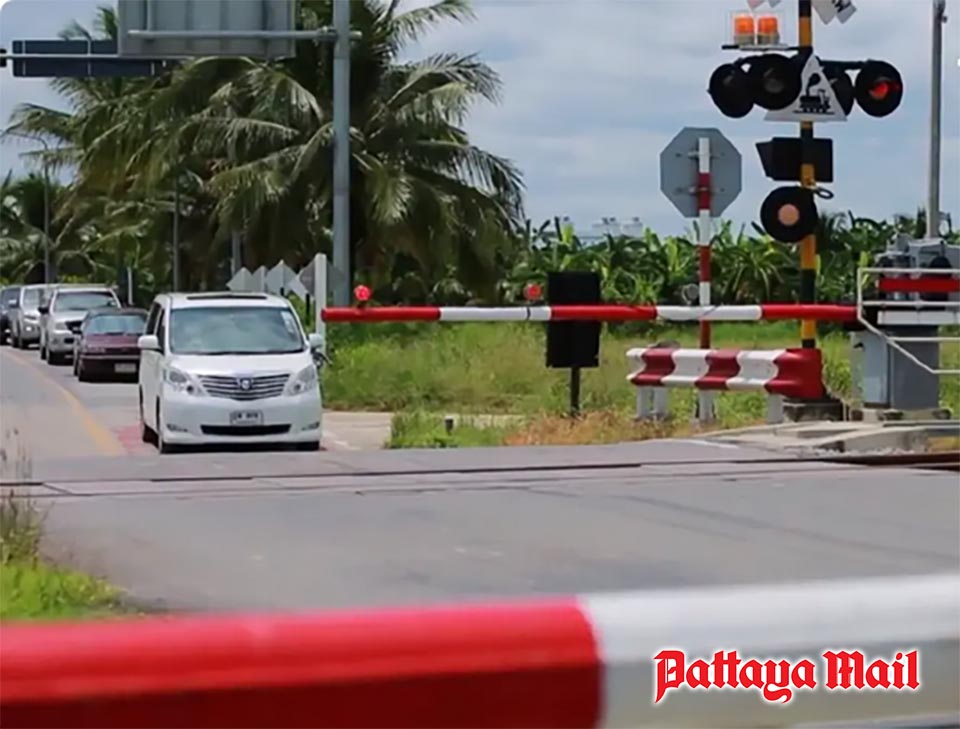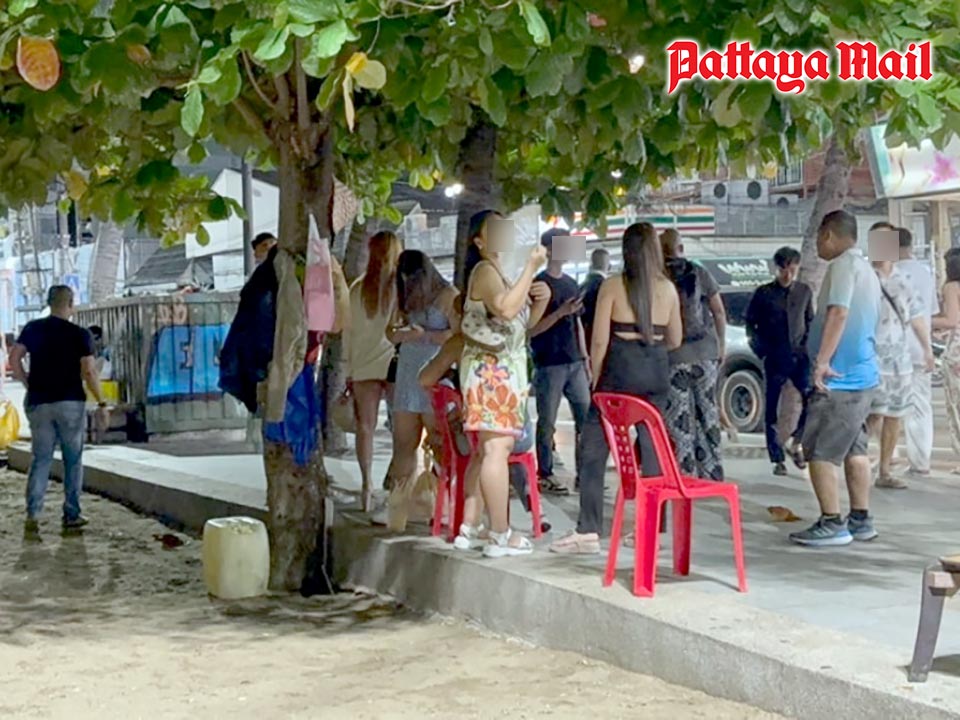0 Σχόλια
0 Μοιράστηκε
46 Views

Κατάλογος
สำราวจพัทยาโซเชียล สังคมออนไลน์ของพัทยาและพื้นที่ใกล้เคียง
-
Παρακαλούμε συνδέσου στην Κοινότητά μας για να δηλώσεις τι σου αρέσει, να σχολιάσεις και να μοιραστείς με τους φίλους σου!
-
 WWW.PATTAYAMAIL.COMPattaya Railway Crossing Danger – SRT hits pickup driver with strict penalty for barrier violationA harsh reminder from the courts: ignoring railway crossing signals can cost you more than just your safety. PATTAYA, Thailand – The State Railway of Thailand (SRT) has announced the court-imposed penalty on a pickup truck driver who recklessly ignored a lowered railway crossing barrier, resulting in a collision with a local passenger train. The Surin Provincial Court found the driver solely responsible and ordered compensation of over 270,000 baht. The SRT reaffirmed its commitment to strict legal enforcement to protect state assets and ensure the safety of passengers and personnel. The incident, which occurred on April 19, 2016, around 9:20 AM, involved a collision between a pickup truck and Local Train No. 421 (a free train service for the public) at a level crossing between Lam Chi and Surin stations in Surin province. According to the investigation, the pickup driver failed to stop despite clear warning and “Stop” signs at the crossing — a violation of Section 63 of the Land Traffic Act, B.E. 2522. The act requires vehicles to slow down and stop at least five meters from the railway before crossing. Meanwhile, the train operator followed all safety protocols, including sounding the horn, flashing headlights, and attempting to brake. However, due to the train’s momentum and short distance, the train was unable to stop in time, resulting in a collision that severely damaged the pickup truck, injured the driver, and caused damage to the train. The total damage was estimated at over 250,000 baht. The Surin Provincial Court ruled that the pickup driver was entirely at fault, and the train operator bore no responsibility. The court ordered the driver and the vehicle owner to jointly pay damages totaling 272,615.79 baht, with 7.5% annual interest on 256,587.79 baht from the filing date (March 30, 2017) until full payment is made. An additional 3,000 baht was ordered for legal and court fees. The SRT urges the public to strictly observe traffic laws, especially at railway crossings, which pose high risks. Violating crossing signals or failing to stop as required by law not only endangers the violator but also threatens public transportation systems and the safety of numerous passengers on board. The State Railway of Thailand warns Pattaya drivers—stop, look, and listen at railway crossings to avoid deadly accidents. Warning to Pattaya Road Users: With increasing traffic and development in Pattaya, road users are urged to exercise extreme caution near railway crossings, particularly in areas where crossings intersect with high-traffic roads. Ignoring railway barriers or signals can lead to tragic accidents, legal penalties, and financial liabilities. Drivers must be vigilant, obey traffic laws, and never attempt to beat the train — even if the road appears clear. The SRT emphasizes that safety at railway crossings is a shared responsibility. All motorists, including tourists and long-term visitors in Pattaya, must be aware of and respect crossing signs, signals, and barriers. In the event of a malfunctioning gate or warning light, drivers should report it immediately to local authorities or the SRT. This case highlights how negligence behind the wheel can result in far-reaching legal and financial consequences—not only to the driver but also to public infrastructure and services. The SRT emphasized it will take all necessary legal actions in every such case to safeguard public interest and passenger safety. SRT Governor also instructed all regional personnel to regularly inspect railway crossings to ensure that warning signs and safety equipment are fully functional. The agency also called for continued public awareness campaigns at the community level and opened channels for the public to report malfunctioning safety equipment or risk-prone crossings. Cooperation with local administrative organizations is being strengthened to prevent future accidents and minimize loss sustainably. Reckless driving at railway crossings endangers lives and leads to heavy legal and financial penalties. Protect yourself and others—always obey traffic laws at railway crossings. Your safety depends on it.0 Σχόλια 0 Μοιράστηκε 46 Views
WWW.PATTAYAMAIL.COMPattaya Railway Crossing Danger – SRT hits pickup driver with strict penalty for barrier violationA harsh reminder from the courts: ignoring railway crossing signals can cost you more than just your safety. PATTAYA, Thailand – The State Railway of Thailand (SRT) has announced the court-imposed penalty on a pickup truck driver who recklessly ignored a lowered railway crossing barrier, resulting in a collision with a local passenger train. The Surin Provincial Court found the driver solely responsible and ordered compensation of over 270,000 baht. The SRT reaffirmed its commitment to strict legal enforcement to protect state assets and ensure the safety of passengers and personnel. The incident, which occurred on April 19, 2016, around 9:20 AM, involved a collision between a pickup truck and Local Train No. 421 (a free train service for the public) at a level crossing between Lam Chi and Surin stations in Surin province. According to the investigation, the pickup driver failed to stop despite clear warning and “Stop” signs at the crossing — a violation of Section 63 of the Land Traffic Act, B.E. 2522. The act requires vehicles to slow down and stop at least five meters from the railway before crossing. Meanwhile, the train operator followed all safety protocols, including sounding the horn, flashing headlights, and attempting to brake. However, due to the train’s momentum and short distance, the train was unable to stop in time, resulting in a collision that severely damaged the pickup truck, injured the driver, and caused damage to the train. The total damage was estimated at over 250,000 baht. The Surin Provincial Court ruled that the pickup driver was entirely at fault, and the train operator bore no responsibility. The court ordered the driver and the vehicle owner to jointly pay damages totaling 272,615.79 baht, with 7.5% annual interest on 256,587.79 baht from the filing date (March 30, 2017) until full payment is made. An additional 3,000 baht was ordered for legal and court fees. The SRT urges the public to strictly observe traffic laws, especially at railway crossings, which pose high risks. Violating crossing signals or failing to stop as required by law not only endangers the violator but also threatens public transportation systems and the safety of numerous passengers on board. The State Railway of Thailand warns Pattaya drivers—stop, look, and listen at railway crossings to avoid deadly accidents. Warning to Pattaya Road Users: With increasing traffic and development in Pattaya, road users are urged to exercise extreme caution near railway crossings, particularly in areas where crossings intersect with high-traffic roads. Ignoring railway barriers or signals can lead to tragic accidents, legal penalties, and financial liabilities. Drivers must be vigilant, obey traffic laws, and never attempt to beat the train — even if the road appears clear. The SRT emphasizes that safety at railway crossings is a shared responsibility. All motorists, including tourists and long-term visitors in Pattaya, must be aware of and respect crossing signs, signals, and barriers. In the event of a malfunctioning gate or warning light, drivers should report it immediately to local authorities or the SRT. This case highlights how negligence behind the wheel can result in far-reaching legal and financial consequences—not only to the driver but also to public infrastructure and services. The SRT emphasized it will take all necessary legal actions in every such case to safeguard public interest and passenger safety. SRT Governor also instructed all regional personnel to regularly inspect railway crossings to ensure that warning signs and safety equipment are fully functional. The agency also called for continued public awareness campaigns at the community level and opened channels for the public to report malfunctioning safety equipment or risk-prone crossings. Cooperation with local administrative organizations is being strengthened to prevent future accidents and minimize loss sustainably. Reckless driving at railway crossings endangers lives and leads to heavy legal and financial penalties. Protect yourself and others—always obey traffic laws at railway crossings. Your safety depends on it.0 Σχόλια 0 Μοιράστηκε 46 Views -
 WWW.PATTAYAMAIL.COMWith fines and quotas in Pattaya bars, many women seek freedom along the beachfront coconut treesWith fines looming and stricter rules ahead, Pattaya’s coconut tree women must decide: adapt or disappear? PATTAYA, Thailand – Pattaya police have stepped up efforts to clear the city’s beaches of so-called ‘coconut tree women’ — a local euphemism for women who offer companionship or private services to foreign tourists, especially along the beachfront under the coconut trees at night. The recent crackdown has reignited debate over whether authorities should steer these women into regulated nightlife zones or tolerate their relatively discreet presence along the sand. The women, many of whom say they prefer working independently on the beach, argue that they’re not disturbing anyone and that their work supports both themselves and the local economy by drawing in tourists. But police say the beach is a public space and that nighttime solicitation undermines Pattaya’s family-friendly image. Bar owners have a different take. Many say they’re pressured by authorities to keep all such activity confined to licensed nightlife venues. In these venues, women must follow strict rules, such as clocking in, wearing numbered badges, and helping bars meet drink sales quotas. Those who break the rules — or leave without permission — can be fined by the establishment, in some cases hundreds or even thousands of baht. “You have to sell beers, sit with customers, and meet targets,” said one woman who recently left a bar job to return to the beach. “It’s more pressure than freedom.” Some locals argue that moving the women into bars is a way to bring regulation and oversight — but for many women, it simply feels like trading one set of risks for another. Unlike on the beach, where they operate more freely, bars require women to pay daily seat fees or share earnings with the venue. The crackdown has not stopped the activity entirely — only pushed it into the shadows. Some women now work in quieter beach areas or wait until police finish their nightly patrols before returning. Others have shifted to app-based arrangements or are considering bar work again despite the restrictions. Authorities have not announced a long-term plan for managing the situation, but they continue to remind the public that offering personal services or seeking clients in public spaces remains against the law. Meanwhile, discussions around reforming relevant laws and providing better protections for those involved in this informal industry remain stalled at the national level. For now, Pattaya’s coconut tree women must choose between the unpredictability of the beach and the rigid structure of the bar scene — all under the watchful eye of police, tourists, and local officials.0 Σχόλια 0 Μοιράστηκε 51 Views
WWW.PATTAYAMAIL.COMWith fines and quotas in Pattaya bars, many women seek freedom along the beachfront coconut treesWith fines looming and stricter rules ahead, Pattaya’s coconut tree women must decide: adapt or disappear? PATTAYA, Thailand – Pattaya police have stepped up efforts to clear the city’s beaches of so-called ‘coconut tree women’ — a local euphemism for women who offer companionship or private services to foreign tourists, especially along the beachfront under the coconut trees at night. The recent crackdown has reignited debate over whether authorities should steer these women into regulated nightlife zones or tolerate their relatively discreet presence along the sand. The women, many of whom say they prefer working independently on the beach, argue that they’re not disturbing anyone and that their work supports both themselves and the local economy by drawing in tourists. But police say the beach is a public space and that nighttime solicitation undermines Pattaya’s family-friendly image. Bar owners have a different take. Many say they’re pressured by authorities to keep all such activity confined to licensed nightlife venues. In these venues, women must follow strict rules, such as clocking in, wearing numbered badges, and helping bars meet drink sales quotas. Those who break the rules — or leave without permission — can be fined by the establishment, in some cases hundreds or even thousands of baht. “You have to sell beers, sit with customers, and meet targets,” said one woman who recently left a bar job to return to the beach. “It’s more pressure than freedom.” Some locals argue that moving the women into bars is a way to bring regulation and oversight — but for many women, it simply feels like trading one set of risks for another. Unlike on the beach, where they operate more freely, bars require women to pay daily seat fees or share earnings with the venue. The crackdown has not stopped the activity entirely — only pushed it into the shadows. Some women now work in quieter beach areas or wait until police finish their nightly patrols before returning. Others have shifted to app-based arrangements or are considering bar work again despite the restrictions. Authorities have not announced a long-term plan for managing the situation, but they continue to remind the public that offering personal services or seeking clients in public spaces remains against the law. Meanwhile, discussions around reforming relevant laws and providing better protections for those involved in this informal industry remain stalled at the national level. For now, Pattaya’s coconut tree women must choose between the unpredictability of the beach and the rigid structure of the bar scene — all under the watchful eye of police, tourists, and local officials.0 Σχόλια 0 Μοιράστηκε 51 Views -
 WWW.PATTAYAMAIL.COMPrivate taxis with cameras raise privacy concerns in Thailand following viral clip of foreign passengersCaught on cam, shared without consent – Thai driver sparks outrage over foreign tourists’ privacy violation. PATTAYA, Thailand – The Thai social media sphere erupted in outrage this week after a video surfaced showing a foreign couple displaying affection inside a private car. The clip, filmed and posted online by the driver, has ignited widespread debate about passenger privacy, consent, and the legal limits of in-vehicle surveillance in Thailand’s ride-hailing and taxi industry. The video, captioned by the driver as “Can’t even focus on driving like this,” clearly shows the faces of the passengers and was widely shared across platforms. Netizens quickly criticized both the act of filming and the decision to upload the video, calling it a serious breach of privacy. While some viewers disapproved of the couple’s behavior inside a public vehicle, the overwhelming response condemned the driver for exposing passengers without consent. Thailand’s Personal Data Protection Act (PDPA), which came into force in 2022, stipulates that collecting and sharing personal data—including identifiable video footage—without consent may result in up to six months in prison, a fine of up to 500,000 baht, or both. Civil lawsuits can also be filed up to ten years from the incident if the victims suffer emotional or reputational damage. Legal experts and commentators point out that such acts could also fall under Thailand’s criminal defamation laws. Section 328 of the Thai Criminal Code defines defamation through public dissemination—including images—as a punishable offense, with possible imprisonment of up to two years and fines up to 200,000 baht. This incident has stirred serious concerns among both Thais and foreigners about the safety and integrity of ride-hailing services. Many cars used in apps like Bolt, Grab, and others are not officially registered taxis but rather private vehicles operating under digital platforms. This distinction matters because it adds complexity to enforcement and passenger expectations. In online forums and comment sections, many Thai users weighed in with their own experiences. Some defended the installation of cameras for safety purposes, especially to resolve disputes, prevent theft, or document criminal acts. However, the overwhelming consensus was clear: using those recordings for online exposure without permission is unacceptable and potentially illegal. One user commented, “I have a dashcam too, just in case something goes wrong. But uploading a video for likes and views? That’s not safety—that’s exploitation.” Another pointed out, “This isn’t a hotel room, it’s a ride. But it’s still not okay to film and upload people without their knowledge. There are laws for that.” Others criticized the modern obsession with viral content. “People these days are addicted to content. They’ll post anything for views, even if it violates someone’s dignity or privacy.” Still others blamed both sides, noting the inappropriate behavior of the couple but reinforcing that the driver had no right to post the footage publicly. The public reaction has also highlighted deeper frustrations with the ethics of the modern ride-hailing industry. “Taxi drivers used to help carry bags, adjust the AC. Now some just look for content or ways to shame passengers,” one user lamented. Several users noted that the vehicle in question appeared to be a private car, possibly working with a ride-hailing app like Bolt, and not a licensed metered taxi. This distinction has led to broader criticism of the app-based transport system, which is sometimes seen as lacking regulation and accountability compared to traditional taxis. This controversy also reinforces why some international tourists have reported mistrust or anxiety about using taxis or ride-hailing services in Thailand. Public morality, privacy norms, and digital behavior are colliding in uncomfortable ways. While dashcams can be powerful tools for safety and truth in disputes, their misuse poses serious threats to personal privacy. As Thailand continues to welcome millions of visitors to destinations like Bangkok, Phuket, and Pattaya, it’s crucial that both drivers and platforms respect ethical and legal standards in digital conduct.0 Σχόλια 0 Μοιράστηκε 49 Views
WWW.PATTAYAMAIL.COMPrivate taxis with cameras raise privacy concerns in Thailand following viral clip of foreign passengersCaught on cam, shared without consent – Thai driver sparks outrage over foreign tourists’ privacy violation. PATTAYA, Thailand – The Thai social media sphere erupted in outrage this week after a video surfaced showing a foreign couple displaying affection inside a private car. The clip, filmed and posted online by the driver, has ignited widespread debate about passenger privacy, consent, and the legal limits of in-vehicle surveillance in Thailand’s ride-hailing and taxi industry. The video, captioned by the driver as “Can’t even focus on driving like this,” clearly shows the faces of the passengers and was widely shared across platforms. Netizens quickly criticized both the act of filming and the decision to upload the video, calling it a serious breach of privacy. While some viewers disapproved of the couple’s behavior inside a public vehicle, the overwhelming response condemned the driver for exposing passengers without consent. Thailand’s Personal Data Protection Act (PDPA), which came into force in 2022, stipulates that collecting and sharing personal data—including identifiable video footage—without consent may result in up to six months in prison, a fine of up to 500,000 baht, or both. Civil lawsuits can also be filed up to ten years from the incident if the victims suffer emotional or reputational damage. Legal experts and commentators point out that such acts could also fall under Thailand’s criminal defamation laws. Section 328 of the Thai Criminal Code defines defamation through public dissemination—including images—as a punishable offense, with possible imprisonment of up to two years and fines up to 200,000 baht. This incident has stirred serious concerns among both Thais and foreigners about the safety and integrity of ride-hailing services. Many cars used in apps like Bolt, Grab, and others are not officially registered taxis but rather private vehicles operating under digital platforms. This distinction matters because it adds complexity to enforcement and passenger expectations. In online forums and comment sections, many Thai users weighed in with their own experiences. Some defended the installation of cameras for safety purposes, especially to resolve disputes, prevent theft, or document criminal acts. However, the overwhelming consensus was clear: using those recordings for online exposure without permission is unacceptable and potentially illegal. One user commented, “I have a dashcam too, just in case something goes wrong. But uploading a video for likes and views? That’s not safety—that’s exploitation.” Another pointed out, “This isn’t a hotel room, it’s a ride. But it’s still not okay to film and upload people without their knowledge. There are laws for that.” Others criticized the modern obsession with viral content. “People these days are addicted to content. They’ll post anything for views, even if it violates someone’s dignity or privacy.” Still others blamed both sides, noting the inappropriate behavior of the couple but reinforcing that the driver had no right to post the footage publicly. The public reaction has also highlighted deeper frustrations with the ethics of the modern ride-hailing industry. “Taxi drivers used to help carry bags, adjust the AC. Now some just look for content or ways to shame passengers,” one user lamented. Several users noted that the vehicle in question appeared to be a private car, possibly working with a ride-hailing app like Bolt, and not a licensed metered taxi. This distinction has led to broader criticism of the app-based transport system, which is sometimes seen as lacking regulation and accountability compared to traditional taxis. This controversy also reinforces why some international tourists have reported mistrust or anxiety about using taxis or ride-hailing services in Thailand. Public morality, privacy norms, and digital behavior are colliding in uncomfortable ways. While dashcams can be powerful tools for safety and truth in disputes, their misuse poses serious threats to personal privacy. As Thailand continues to welcome millions of visitors to destinations like Bangkok, Phuket, and Pattaya, it’s crucial that both drivers and platforms respect ethical and legal standards in digital conduct.0 Σχόλια 0 Μοιράστηκε 49 Views -
 WWW.PATTAYAMAIL.COMHazardous waste found in U.S. shipment at Laem Chabang Port – Thailand demands immediate returnOfficials inspect aluminum scrap containers at Laem Chabang Port in Chonburi, uncovering hazardous e-waste contamination. PATTAYA, Thailand – Thailand’s Pollution Control Department (PCD), in collaboration with the Department of Industrial Works (DIW) and the Customs Department, has uncovered hazardous waste in six imported shipping containers at Laem Chabang Port. Declared as “mixed metal scrap (aluminum scrap),” the containers—totaling over 110 tons—were found to contain lead-contaminated electronic circuit boards, classifying them as hazardous waste under the Basel Convention. Ms. Preeyaporn Suwannakes, Director-General of the Pollution Control Department, stated that the inspection team, which included representatives from the Chonburi Governor’s Office and the Ecological Alert and Recovery Thailand Foundation (EARTH), confirmed the presence of electronic waste listed under Category 5.2, Item 2.18 of Thailand’s Hazardous Substances Act B.E. 2535 (1992). These items fall under the scope of the Basel Convention, which regulates the transboundary movement of hazardous waste. The Director-General emphasized that the shipment entered Thailand without prior approval from the DIW or consent from the destination country, a violation of both Thai law and the principles of the Basel Convention. Notably, the United States—the country of origin—has not ratified the Basel Convention and therefore lacks the legal authority to export hazardous waste to countries that are signatories, such as Thailand. As Thailand’s official Basel Convention coordination center, the PCD will notify the Convention Secretariat and coordinate with the DIW to engage relevant U.S. authorities. Thailand is expediting the return of the illegal shipment to prevent the country from becoming a dumping ground for foreign hazardous waste. (TNA)0 Σχόλια 0 Μοιράστηκε 57 Views
WWW.PATTAYAMAIL.COMHazardous waste found in U.S. shipment at Laem Chabang Port – Thailand demands immediate returnOfficials inspect aluminum scrap containers at Laem Chabang Port in Chonburi, uncovering hazardous e-waste contamination. PATTAYA, Thailand – Thailand’s Pollution Control Department (PCD), in collaboration with the Department of Industrial Works (DIW) and the Customs Department, has uncovered hazardous waste in six imported shipping containers at Laem Chabang Port. Declared as “mixed metal scrap (aluminum scrap),” the containers—totaling over 110 tons—were found to contain lead-contaminated electronic circuit boards, classifying them as hazardous waste under the Basel Convention. Ms. Preeyaporn Suwannakes, Director-General of the Pollution Control Department, stated that the inspection team, which included representatives from the Chonburi Governor’s Office and the Ecological Alert and Recovery Thailand Foundation (EARTH), confirmed the presence of electronic waste listed under Category 5.2, Item 2.18 of Thailand’s Hazardous Substances Act B.E. 2535 (1992). These items fall under the scope of the Basel Convention, which regulates the transboundary movement of hazardous waste. The Director-General emphasized that the shipment entered Thailand without prior approval from the DIW or consent from the destination country, a violation of both Thai law and the principles of the Basel Convention. Notably, the United States—the country of origin—has not ratified the Basel Convention and therefore lacks the legal authority to export hazardous waste to countries that are signatories, such as Thailand. As Thailand’s official Basel Convention coordination center, the PCD will notify the Convention Secretariat and coordinate with the DIW to engage relevant U.S. authorities. Thailand is expediting the return of the illegal shipment to prevent the country from becoming a dumping ground for foreign hazardous waste. (TNA)0 Σχόλια 0 Μοιράστηκε 57 Views -
 WWW.PATTAYAMAIL.COMMonths ahead may be wet for Pattaya, raising concerns for tourism and businessRainclouds over Pattaya Beach – Experts warn that the popular tourist city could face flooding and storm impacts during Thailand’s unusually wet monsoon season. (Photo – Khao Pra Tumnak Hill, Pattaya) PATTAYA, Thailand – Pattaya’s tourism industry and local businesses may face major disruptions in the coming months as Thailand braces for an unusually wet monsoon season, with increased risks of flooding and storm impacts. According to Professor Sonthi Kotchawat, a public health and environmental expert, Thailand is seeing heavy rainfall across nearly 80% of the country. Regions such as Greater Bangkok, the North, Central Plains, and Andaman coast are expected to experience particularly intense downpours. From June through mid-October, Thailand is forecasted to see persistent rain, with October being the most at-risk month for tropical storms and typhoons, due to shifting monsoon winds and atmospheric conditions. Storms may begin as early as May, but their likelihood increases significantly from June onward. While southern border provinces like Pattani, Yala, and Narathiwat have largely escaped the worst of the recent weather, coastal areas like Pattaya are vulnerable to both urban flooding and storm surge, especially given their reliance on tourism infrastructure and beachfront businesses. Experts also warn that extreme heat across South Asia, with temperatures reaching 50°C in India and Pakistan, could further fuel storm formation in the Bay of Bengal, increasing the chance of cyclonic systems making landfall in Thailand. For Pattaya, this forecast could mean more frequent beach closures, transport delays, and reduced tourist footfall—challenges that local authorities and businesses must prepare for. With peak tourist events and festivals typically planned from October onward, contingency planning for weather-related disruptions is now more critical than ever.0 Σχόλια 0 Μοιράστηκε 49 Views
WWW.PATTAYAMAIL.COMMonths ahead may be wet for Pattaya, raising concerns for tourism and businessRainclouds over Pattaya Beach – Experts warn that the popular tourist city could face flooding and storm impacts during Thailand’s unusually wet monsoon season. (Photo – Khao Pra Tumnak Hill, Pattaya) PATTAYA, Thailand – Pattaya’s tourism industry and local businesses may face major disruptions in the coming months as Thailand braces for an unusually wet monsoon season, with increased risks of flooding and storm impacts. According to Professor Sonthi Kotchawat, a public health and environmental expert, Thailand is seeing heavy rainfall across nearly 80% of the country. Regions such as Greater Bangkok, the North, Central Plains, and Andaman coast are expected to experience particularly intense downpours. From June through mid-October, Thailand is forecasted to see persistent rain, with October being the most at-risk month for tropical storms and typhoons, due to shifting monsoon winds and atmospheric conditions. Storms may begin as early as May, but their likelihood increases significantly from June onward. While southern border provinces like Pattani, Yala, and Narathiwat have largely escaped the worst of the recent weather, coastal areas like Pattaya are vulnerable to both urban flooding and storm surge, especially given their reliance on tourism infrastructure and beachfront businesses. Experts also warn that extreme heat across South Asia, with temperatures reaching 50°C in India and Pakistan, could further fuel storm formation in the Bay of Bengal, increasing the chance of cyclonic systems making landfall in Thailand. For Pattaya, this forecast could mean more frequent beach closures, transport delays, and reduced tourist footfall—challenges that local authorities and businesses must prepare for. With peak tourist events and festivals typically planned from October onward, contingency planning for weather-related disruptions is now more critical than ever.0 Σχόλια 0 Μοιράστηκε 49 Views -
 WWW.PATTAYAMAIL.COMThailand’s Safety Image Splits – Chinese concerned, Europeans confidentWhile Chinese visitors pull back, travelers from Europe and India still see Thailand as safe, vibrant, and welcoming. PATTAYA, Thailand – According to a 2025 survey by Dragon Trail International, over 50% of Chinese respondents now consider Thailand unsafe, a sharp increase from 38% in 2024. The deterioration in Thailand’s image among Chinese travelers is largely attributed to sensational media coverage of high-profile crimes—such as the kidnapping of a Chinese celebrity—and rising concerns about “grey businesses” operating in tourist areas. Viral social media content, sometimes amplified by influencers or nationalist commentary, has intensified fears, particularly among potential first-time travelers from China. In stark contrast, tourists from Europe and India continue to view Thailand—especially destinations like Pattaya, Phuket, and Bangkok—as safe and attractive. There are several reasons for this divergence in perception: Different Media Ecosystems: Western and Indian media have generally portrayed Thailand as a welcoming and well-regulated tourist destination, with less emphasis on isolated criminal incidents. Familiarity with Local Infrastructure: Repeat visitors from Europe and India often have positive prior experiences, and are more familiar with Thailand’s safety protocols, transportation systems, and tourist services. Perception of Value and Hospitality: For many Indian and European travelers, Thailand offers good value, friendly service, and a vibrant cultural experience, which outweighs any perceived risks. Targeted Tourism Campaigns: The Thai government has invested in promoting curated travel experiences for Indian and European markets, including wellness, shopping, historical sites, and nightlife—particularly in areas like Pattaya, where Indian visitors are a growing segment. Personal Freedoms and Customization: Western tourists, in particular, appreciate the freedom to customize their experiences and often feel safe when traveling independently, especially in well-policed tourist zones. Ultimately, while safety concerns are reshaping Chinese outbound tourism patterns, Thailand remains a top-of-mind destination for Europe and India—not only because of its affordability and scenic appeal, but also because these travelers feel confident navigating it safely. This disparity underscores the importance of tailoring tourism messaging to each market’s perceptions, values, and cultural filters.0 Σχόλια 0 Μοιράστηκε 49 Views
WWW.PATTAYAMAIL.COMThailand’s Safety Image Splits – Chinese concerned, Europeans confidentWhile Chinese visitors pull back, travelers from Europe and India still see Thailand as safe, vibrant, and welcoming. PATTAYA, Thailand – According to a 2025 survey by Dragon Trail International, over 50% of Chinese respondents now consider Thailand unsafe, a sharp increase from 38% in 2024. The deterioration in Thailand’s image among Chinese travelers is largely attributed to sensational media coverage of high-profile crimes—such as the kidnapping of a Chinese celebrity—and rising concerns about “grey businesses” operating in tourist areas. Viral social media content, sometimes amplified by influencers or nationalist commentary, has intensified fears, particularly among potential first-time travelers from China. In stark contrast, tourists from Europe and India continue to view Thailand—especially destinations like Pattaya, Phuket, and Bangkok—as safe and attractive. There are several reasons for this divergence in perception: Different Media Ecosystems: Western and Indian media have generally portrayed Thailand as a welcoming and well-regulated tourist destination, with less emphasis on isolated criminal incidents. Familiarity with Local Infrastructure: Repeat visitors from Europe and India often have positive prior experiences, and are more familiar with Thailand’s safety protocols, transportation systems, and tourist services. Perception of Value and Hospitality: For many Indian and European travelers, Thailand offers good value, friendly service, and a vibrant cultural experience, which outweighs any perceived risks. Targeted Tourism Campaigns: The Thai government has invested in promoting curated travel experiences for Indian and European markets, including wellness, shopping, historical sites, and nightlife—particularly in areas like Pattaya, where Indian visitors are a growing segment. Personal Freedoms and Customization: Western tourists, in particular, appreciate the freedom to customize their experiences and often feel safe when traveling independently, especially in well-policed tourist zones. Ultimately, while safety concerns are reshaping Chinese outbound tourism patterns, Thailand remains a top-of-mind destination for Europe and India—not only because of its affordability and scenic appeal, but also because these travelers feel confident navigating it safely. This disparity underscores the importance of tailoring tourism messaging to each market’s perceptions, values, and cultural filters.0 Σχόλια 0 Μοιράστηκε 49 Views -
 WWW.PATTAYAMAIL.COMBuilding Harmony in Pattaya – Should locals adapt to foreigners or vice versa?Bridging Cultures in Pattaya – Locals and foreigners are encouraged to adapt to one another to build a stronger, more respectful community. PATTAYA, Thailand – As Pattaya continues to grow as one of Thailand’s most dynamic international cities, the challenge of maintaining harmony between locals and long-term foreign residents becomes increasingly important. With diverse cultures, expectations, and behaviors colliding in daily life and business, fostering mutual understanding is key to sustaining social peace and economic stability in the city. To maintain social harmony and promote stable business relations, it’s not just a question of whether locals should adapt to foreigners or vice versa — the answer lies in both sides meeting halfway. Locals in Pattaya can take proactive steps to create a more welcoming environment for foreigners. Communication is a key starting point. By learning basic English phrases, local business owners, service providers, and public servants can significantly improve interactions with international visitors. Even simple efforts—like speaking clearly, smiling, and showing patience—can leave a lasting impression. For example, a Thai street food vendor who learns how to say “no spicy” or “chicken or pork?” in English can more easily connect with foreign customers, avoid misunderstandings, and build customer loyalty. In business, adapting practices to meet foreign expectations—such as transparent pricing, clear menus, multilingual signage, and flexible service models—can boost trust and customer retention. Consider a massage shop that adds an English menu with clear service times and prices. This reduces confusion, creates a sense of transparency, and draws repeat business from international clients who feel more secure. Beyond commerce, embracing diversity in everyday life is crucial. Locals who view foreigners not merely as tourists but as contributors—bringing in investment, culture, and fresh ideas—help reduce harmful stereotypes and encourage meaningful cultural exchange. An example would be local neighborhood groups inviting foreign residents to join community clean-ups or Songkran celebrations, building friendships that cross cultural lines. At the same time, foreigners—whether visiting or living in Pattaya—carry the responsibility to adapt and show respect for Thai customs, laws, and values. Understanding cultural norms such as dressing modestly at temples, avoiding offensive gestures, and honoring the monarchy are vital to building trust within local communities. For instance, a foreign tourist visiting a shrine who removes their shoes, covers their shoulders, and bows respectfully is more likely to be warmly received and appreciated. Language efforts should go both ways. Foreigners who make the effort to learn basic Thai greetings or expressions often find warmer, more genuine interactions. These small but respectful gestures demonstrate appreciation for Thai culture and a willingness to engage, rather than remain outsiders. Even saying “sawasdee krub/ka” at the 7-Eleven or “khop khun” after a meal shows effort and respect that locals don’t overlook. Respecting local business customs—such as bargaining politely, accepting local business hours, and showing gratitude for services—can also go a long way in maintaining positive relations. An example: instead of aggressively haggling at a market, a foreigner who bargains with a smile and humor is more likely to be treated with kindness—even if they don’t get the lowest price. Rather than trying to replicate their home cultures, foreigners who embrace Thai ways tend to build deeper, more rewarding connections with their communities. For example, a long-term visitor who joins a Thai language class or volunteers at a local school is not only learning but also giving back to the community that hosts them. In Pattaya, where tourism and international residents play a major role in the economy, peaceful coexistence isn’t just desirable—it’s essential. The unique mix of Thai traditions and global influences brings both opportunities and challenges, making mutual respect and adaptation crucial. When locals and foreigners make the effort to understand one another, Pattaya becomes more than a tourist city—it becomes a thriving model of multicultural harmony.0 Σχόλια 0 Μοιράστηκε 49 Views
WWW.PATTAYAMAIL.COMBuilding Harmony in Pattaya – Should locals adapt to foreigners or vice versa?Bridging Cultures in Pattaya – Locals and foreigners are encouraged to adapt to one another to build a stronger, more respectful community. PATTAYA, Thailand – As Pattaya continues to grow as one of Thailand’s most dynamic international cities, the challenge of maintaining harmony between locals and long-term foreign residents becomes increasingly important. With diverse cultures, expectations, and behaviors colliding in daily life and business, fostering mutual understanding is key to sustaining social peace and economic stability in the city. To maintain social harmony and promote stable business relations, it’s not just a question of whether locals should adapt to foreigners or vice versa — the answer lies in both sides meeting halfway. Locals in Pattaya can take proactive steps to create a more welcoming environment for foreigners. Communication is a key starting point. By learning basic English phrases, local business owners, service providers, and public servants can significantly improve interactions with international visitors. Even simple efforts—like speaking clearly, smiling, and showing patience—can leave a lasting impression. For example, a Thai street food vendor who learns how to say “no spicy” or “chicken or pork?” in English can more easily connect with foreign customers, avoid misunderstandings, and build customer loyalty. In business, adapting practices to meet foreign expectations—such as transparent pricing, clear menus, multilingual signage, and flexible service models—can boost trust and customer retention. Consider a massage shop that adds an English menu with clear service times and prices. This reduces confusion, creates a sense of transparency, and draws repeat business from international clients who feel more secure. Beyond commerce, embracing diversity in everyday life is crucial. Locals who view foreigners not merely as tourists but as contributors—bringing in investment, culture, and fresh ideas—help reduce harmful stereotypes and encourage meaningful cultural exchange. An example would be local neighborhood groups inviting foreign residents to join community clean-ups or Songkran celebrations, building friendships that cross cultural lines. At the same time, foreigners—whether visiting or living in Pattaya—carry the responsibility to adapt and show respect for Thai customs, laws, and values. Understanding cultural norms such as dressing modestly at temples, avoiding offensive gestures, and honoring the monarchy are vital to building trust within local communities. For instance, a foreign tourist visiting a shrine who removes their shoes, covers their shoulders, and bows respectfully is more likely to be warmly received and appreciated. Language efforts should go both ways. Foreigners who make the effort to learn basic Thai greetings or expressions often find warmer, more genuine interactions. These small but respectful gestures demonstrate appreciation for Thai culture and a willingness to engage, rather than remain outsiders. Even saying “sawasdee krub/ka” at the 7-Eleven or “khop khun” after a meal shows effort and respect that locals don’t overlook. Respecting local business customs—such as bargaining politely, accepting local business hours, and showing gratitude for services—can also go a long way in maintaining positive relations. An example: instead of aggressively haggling at a market, a foreigner who bargains with a smile and humor is more likely to be treated with kindness—even if they don’t get the lowest price. Rather than trying to replicate their home cultures, foreigners who embrace Thai ways tend to build deeper, more rewarding connections with their communities. For example, a long-term visitor who joins a Thai language class or volunteers at a local school is not only learning but also giving back to the community that hosts them. In Pattaya, where tourism and international residents play a major role in the economy, peaceful coexistence isn’t just desirable—it’s essential. The unique mix of Thai traditions and global influences brings both opportunities and challenges, making mutual respect and adaptation crucial. When locals and foreigners make the effort to understand one another, Pattaya becomes more than a tourist city—it becomes a thriving model of multicultural harmony.0 Σχόλια 0 Μοιράστηκε 49 Views -
 WWW.FACEBOOK.COMหนุ่มวัย 27 ปี ควบเก๋งชนเสาไฟฟ้าพลิกคว่ำล้อชี้ฟ้า เมื่อเวลา 03.06 น.วันที่ 28 พฤษภาคม 2568 ร.ต.อ.ศรสุพรรณ อดทนศรีอ...หนุ่มวัย 27 ปี ควบเก๋งชนเสาไฟฟ้าพลิกคว่ำล้อชี้ฟ้า เมื่อเวลา 03.06 น.วันที่ 28 พฤษภาคม 2568 ร.ต.อ.ศรสุพรรณ อดทนศรีอนันต์ รอง สว.สอบสวน สภ.บางละมุง รับแจ้งอุบัติเหตุรถยนต์กระบะเสียหลักพลิกคว่ำ ตีลังกาล้อชี้ฟ้า เหตุเกิดที่ บนถนนหลวงแผ่นดินหมายเลข 36 บายพาสชลบุรีระยอง ต.หนองปลาไหล อ.บางละมุง จ.ชลบุรี หลังรับแจ้งจึงประสานกำลังเจ้าหน้าที่อาสาสมัครกู้ภัยสว่างบริบูรณ์ธรรมสถานเมืองพัทยารีบไปตรวจสอบ ที่เกิดเหตุพบรถยนต์เก๋งยี่ห้อฮอนด้า ซิตตี้ สีดำ หมายเลขทะเบียน จอ8164 ชลบุรี เสียหลักพลิกคว่ำหงายท้องล้อชี้ฟ้า ได้รับความเสียหายยับเยิน มีนาย วุฒินันต์ ขันทะเสน อายุ 27 ปี เป็นคนขับ ได้รับบาดเจ็บที่ดั้งจมูก เจ้าหน้าที่กู้ภัยฯปฐมพยาบาลเบื้องต้น ก่อนเคลื่อนย้ายส่งโรงพยาบาลพัทยาปัทมคุณ ในที่เกิดเหตุยังพบเสาไฟส่องสว่างได้รับความเสียหาย หักโค่นอีก 1 ต้น สอบถามนาย วุฒินันต์ ขันทะเสน คนขับ ทราบว่าตนเองขับมาจากระยองกลับบ้านแถวตะเคียนเตี้ย แต่ใกล้ถึงช่วงยูเทิร์นกลับรถ ไม่รู้ว่าตนเองวูบหลับไปตอนไหน มารู้ตัวอีกทีก็ชนกับเสาไฟส่องสว่าง แล้วตีลังหาพลิกคว่ำล้อชีฟ้าดังกล่าว ภาพ/ข่าว ทิวากร กฤษมณี ผู้สื่อข่าวภูมิภาคประจำเมืองพัทยา จ.ชลบุรี0 Σχόλια 0 Μοιράστηκε 81 Views
WWW.FACEBOOK.COMหนุ่มวัย 27 ปี ควบเก๋งชนเสาไฟฟ้าพลิกคว่ำล้อชี้ฟ้า เมื่อเวลา 03.06 น.วันที่ 28 พฤษภาคม 2568 ร.ต.อ.ศรสุพรรณ อดทนศรีอ...หนุ่มวัย 27 ปี ควบเก๋งชนเสาไฟฟ้าพลิกคว่ำล้อชี้ฟ้า เมื่อเวลา 03.06 น.วันที่ 28 พฤษภาคม 2568 ร.ต.อ.ศรสุพรรณ อดทนศรีอนันต์ รอง สว.สอบสวน สภ.บางละมุง รับแจ้งอุบัติเหตุรถยนต์กระบะเสียหลักพลิกคว่ำ ตีลังกาล้อชี้ฟ้า เหตุเกิดที่ บนถนนหลวงแผ่นดินหมายเลข 36 บายพาสชลบุรีระยอง ต.หนองปลาไหล อ.บางละมุง จ.ชลบุรี หลังรับแจ้งจึงประสานกำลังเจ้าหน้าที่อาสาสมัครกู้ภัยสว่างบริบูรณ์ธรรมสถานเมืองพัทยารีบไปตรวจสอบ ที่เกิดเหตุพบรถยนต์เก๋งยี่ห้อฮอนด้า ซิตตี้ สีดำ หมายเลขทะเบียน จอ8164 ชลบุรี เสียหลักพลิกคว่ำหงายท้องล้อชี้ฟ้า ได้รับความเสียหายยับเยิน มีนาย วุฒินันต์ ขันทะเสน อายุ 27 ปี เป็นคนขับ ได้รับบาดเจ็บที่ดั้งจมูก เจ้าหน้าที่กู้ภัยฯปฐมพยาบาลเบื้องต้น ก่อนเคลื่อนย้ายส่งโรงพยาบาลพัทยาปัทมคุณ ในที่เกิดเหตุยังพบเสาไฟส่องสว่างได้รับความเสียหาย หักโค่นอีก 1 ต้น สอบถามนาย วุฒินันต์ ขันทะเสน คนขับ ทราบว่าตนเองขับมาจากระยองกลับบ้านแถวตะเคียนเตี้ย แต่ใกล้ถึงช่วงยูเทิร์นกลับรถ ไม่รู้ว่าตนเองวูบหลับไปตอนไหน มารู้ตัวอีกทีก็ชนกับเสาไฟส่องสว่าง แล้วตีลังหาพลิกคว่ำล้อชีฟ้าดังกล่าว ภาพ/ข่าว ทิวากร กฤษมณี ผู้สื่อข่าวภูมิภาคประจำเมืองพัทยา จ.ชลบุรี0 Σχόλια 0 Μοιράστηκε 81 Views -
 WWW.FACEBOOK.COMตามสั่งร้านบ้านๆ ริมทะเลระยอง คนแนะนำมาเยอะ จนต้องตามมารีวิว สั่งกะเพราปูผัดมาแบบแห้งๆ เค้าใช้ตรงก้ตามสั่งร้านบ้านๆ ริมทะเลระยอง คนแนะนำมาเยอะ จนต้องตามมารีวิว สั่งกะเพราปูผัดมาแบบแห้งๆ เค้าใช้ตรงก้ามอ่อนเนื้อปูหวาน อีกอย่างที่ต้องสั่ง ไข่เจียวฟูกรอบแบบนี้ที่ตามหา กินกับต้มยำน้ำใส เผ็ดๆเปรี้ยวๆ แซ่บบ ชอบตรงกับข้าวไม่ติดหวาน ซีฟู้ดสด ใครกลัวคนเยอะโทรมาสั่งก่อนได้ แบบที่เราสั่งราดข้าวพิเศษ 70(ถ้าธรรมดา50) กับข้าว 100 ร้าน เจ๊ซีตามสั่งระยอง 📍พิกัด : ปากน้ำระยอง https://maps.app.goo.gl/s6XBFqcU6fK1r5E39…0 Σχόλια 0 Μοιράστηκε 80 Views
WWW.FACEBOOK.COMตามสั่งร้านบ้านๆ ริมทะเลระยอง คนแนะนำมาเยอะ จนต้องตามมารีวิว สั่งกะเพราปูผัดมาแบบแห้งๆ เค้าใช้ตรงก้ตามสั่งร้านบ้านๆ ริมทะเลระยอง คนแนะนำมาเยอะ จนต้องตามมารีวิว สั่งกะเพราปูผัดมาแบบแห้งๆ เค้าใช้ตรงก้ามอ่อนเนื้อปูหวาน อีกอย่างที่ต้องสั่ง ไข่เจียวฟูกรอบแบบนี้ที่ตามหา กินกับต้มยำน้ำใส เผ็ดๆเปรี้ยวๆ แซ่บบ ชอบตรงกับข้าวไม่ติดหวาน ซีฟู้ดสด ใครกลัวคนเยอะโทรมาสั่งก่อนได้ แบบที่เราสั่งราดข้าวพิเศษ 70(ถ้าธรรมดา50) กับข้าว 100 ร้าน เจ๊ซีตามสั่งระยอง 📍พิกัด : ปากน้ำระยอง https://maps.app.goo.gl/s6XBFqcU6fK1r5E39…0 Σχόλια 0 Μοιράστηκε 80 Views
© 2025 พัทยาโซเชียล Pattaya.Social
 Greek
Greek



